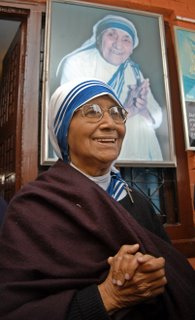
Great works are performed not by strength but by perseverance
–Samuel Johnson
Those who dedicate their lives for the sake of human being are aloof from glitz and glitter; they are the followers of an old adage: simple living, high thinking.
Sister Nirmala, 71, who succeeded late Mother Teresa, the epitome of humanity, eight years ago, is not only kind-hearted but is also a hallmark of simplicity. When she was growing up in India, she says she never thought that she would convert to Christianity; will be elected superior general of Missionaries of Charity, an organization with branches in 131 countries, more than six hundred centers where three thousand sisters, brothers and volunteers work. "I was a die hard Hindu," she reminisces her childhood spent in Ranchi, Bihar (India) in 1940s.
"When I was 10 years old, I stumbled upon a statue of Jesus. Initially, I was frightened to see it but gradually liked it." Another turning point occurred in Patna Women's College in 1951. Her roommate was a Hindu girl who would kneel down for prayer as the church bells rang. "Suddenly, God Jesus became alive in me," she sallies. Then, she started devouring everything about Jesus.
Circa 1957: She went to Kolkata to meet Mother Teresa. After an enlightening episode, she says, she converted to Christianity. Since then, she has devoted her daily life for the sake of missionary activities; studied law upon the insistence of Mother Teresa and took initiation of establishing the missionary centers in Panama, New York and Kathmandu.
At Mitrapark, a Kathmandu neighborhood, in the Missionaries' erstwhile-unnoticed Kathmandu branch, she kept herself busy receiving bouquet from and posing for photos with her well wishers. As the news of her arrival spread, people of all walks of life thronged into the premise. Her two-week long Nepal tour was reminiscent of visit of head of the state. She was seen caressing the children two times in Maiti Nepal.
Immediately after entering Nepal from Kakarbhitta border, she remarked: "No one should seek his own kingdom. Once the kingdom of God is realized, love's kingdom will emerge." Her arrival was a beacon of hope for the war-ravaged country, Nepal. She suggested: "War will not yield peace, love definitely will. All of us should strive to bring peace." Incidentally, she told Time Magazine that she chose the path of compassion after witnessing the violence that crept in during1947's partition of India. It's hard to say how much Sister Nirmala is moved by the escalating violence in the land of her ancestors. However, despite the scribes' reiteration that warring forces would not heed her call, she stressed on love and compassion.
In an afternoon of January 16, she arrived at Kantipur TV's studio and gave interview to a talk show called Fireside. When she returned from the studio, she handed over lockets of Jesus and Mother Teresa to the bystanders. In the chilling cold of shivering Kathmandu winter, she wore sandals without stockings. A year ago, she did the same while meeting US president George Bush, arguably world's most powerful person, in White House. She told me that she talked about Missionaries service with the US president. Besides running health camps in rural Nepal, Missionaries runs two schools for poor and downtrodden students. She stayed in Pokhara Care Center from Jan 17 to Jan 25.
Daughter of a migrant ex-Indian Army from Syangja, why did Sister Nirmala take refuge in religion to serve the poor is a pertinent question that must have followed her like a silhouette. But, the great mission initiated by Albanian Mother Teresa to serve poor, marginalized and needy lot, was followed by her, which has been a token of pride for her Nepalese brethren.
Sister Nirmala, however, is not flawless. She had very vague idea of current Nepal. When asked who she would choose-Prachanda or King Gyanendra to meet given a choice- she was baffled and asked: "Who is Prachanda?" When someone told her he was Maoist supremo, she remarked: "For me, both of them are equal. I'll meet both."
Sister Nirmala must have badly felt the absence of Mother Teresa. Following Mother's footstep is not cricket. After succeeding her, she had glibly told: "No one can replace her." Mother Teresa would take Sister Nirmala along with her in world tour. She was kind of confidante of Mother. "She was out of this world," she said, recalling her first meeting in 1958 with the Nobel Peace prize winner.
Where does the energy to serve the poor come from? She paused for a while and quipped: "Prayer! Prayer gives that energy." And, perhaps perseverance too, as English critic Johnson suggested.
Pic by Bikas Karki
This article was originally published in Nepal Magazine
No comments:
Post a Comment